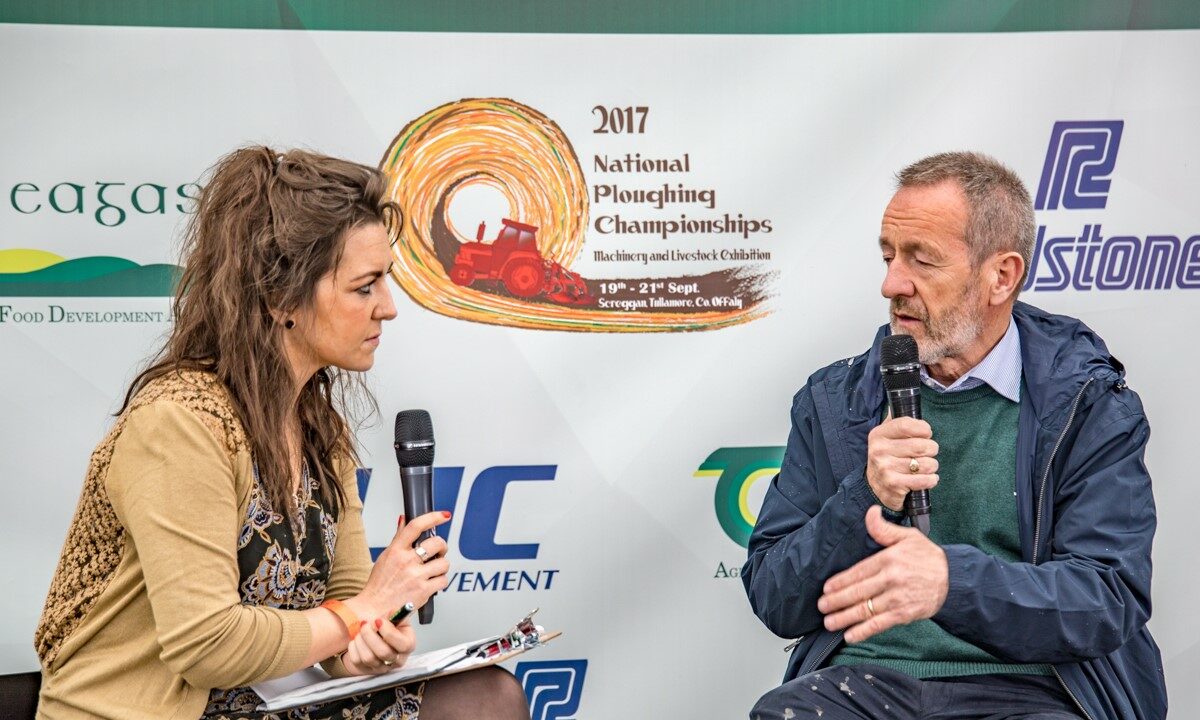The issues of farm labour shortages, Brexit, CAP reforms and beef factories were discussed by Irish MEP Sean Kelly when he sat down for a quick interview with AgriLand.
Interviewed by Claire Mc Cormack in the AgriLand stand yesterday afternoon (Wednesday, September 20) at the National Ploughing Championships, Kelly was first asked about the issue of Brexit.
Kelly said that if common sense prevails, which it should, there will be a withdrawal agreement made between the EU and the UK, followed by a long transitional period.
This would allow assurances for a number of years of little or no change, allowing time for either the UK to change its mind about leaving the union, or adequate preparations to be undertaken to minimise impact. The UK is slowly coming around to this idea, with strong support across all parties for it, he said.
Regarding the topic of CAP (Common Agricultural Policy) reform, Kelly said he does not believe the Irish agricultural sector has a lot to worry about with the current emphasis on “greening”. He noted that a lot of farmers already implement environmentally-friendly practices and there is a lot going on without people realising it.
Kelly said he was very impressed when he attended the recent Energy In Agriculture event in Gurteen Agricultural College, Co. Tipperary, noting that there was “breathtaking” innovation and progress taking place. He said – with the corrective mindset that is now prevalent in farmers, and supports such as Teagasc in place – the incoming changes shouldn’t be that challenging for farmers.
Questioned on the challenge of rural redevelopment and rural depopulation, the MEP agreed that this was a serious worry now, noting that his own area of Killarney had been hit hard by people leaving. He added that the death-birth ratio in Cahersiveen, for example, was worryingly one-sided at a figure of 10:1.
In response to this problem, Kelly said the roll-out of broadband would make a big difference to halting the depopulation.
Regarding the issue of labour shortages that farmers are encountering, particularly for longevity and succession – with young people seeing their parents under severe pressure – Kelly said that succession had to be remedied. He said farmers have to move quicker to give young people a say and some responsibilities in running farms – not just waiting “years and years” before handing them over.
In relation to labour, he said, this is quite an issue in some areas. He said that by pooling resources, by strong community spirit and by forming discussion groups, farmers can discuss and plan for times when labour is short. In a broader sense, a lot of the problem can be solved by co-operation, he added.
Another factor, however, depended on a farm being profitable. The MEP noted that it has thankfully been a good year for dairy farmers and somewhat better for tillage farmers – until recently.
All that area has to be looked at and in a different manner to previously, he added.
Kelly noted he was currently working on changes, which he will be discussing with the farming organisations, to bring more profit back to farmers. He cautioned, however, that people need to look at the long-term rather than the short-term.
While farmer protests, for example, are necessary, they are not long-term – so it is necessary to took at long-term strategies.
When pressed on what sort of strategies, Kelly said how the factories operate needs to be looked at. The beef grading system, he said, is “almost illogical“.
“You could find the best stock-man in the world,” he said. “Then bring a few bullocks into the yard and get him to look at them; he gives them the all clear, saying they’re perfect. You then ask what they are worth and you are given one answer. However, when you actually get paid for them it can be a very different figure.
“In any other sector, if you ask an expert you get an exact answer but that is not the case in beef,” the MEP added, stressing that changes will “have to be made, and soon”.
